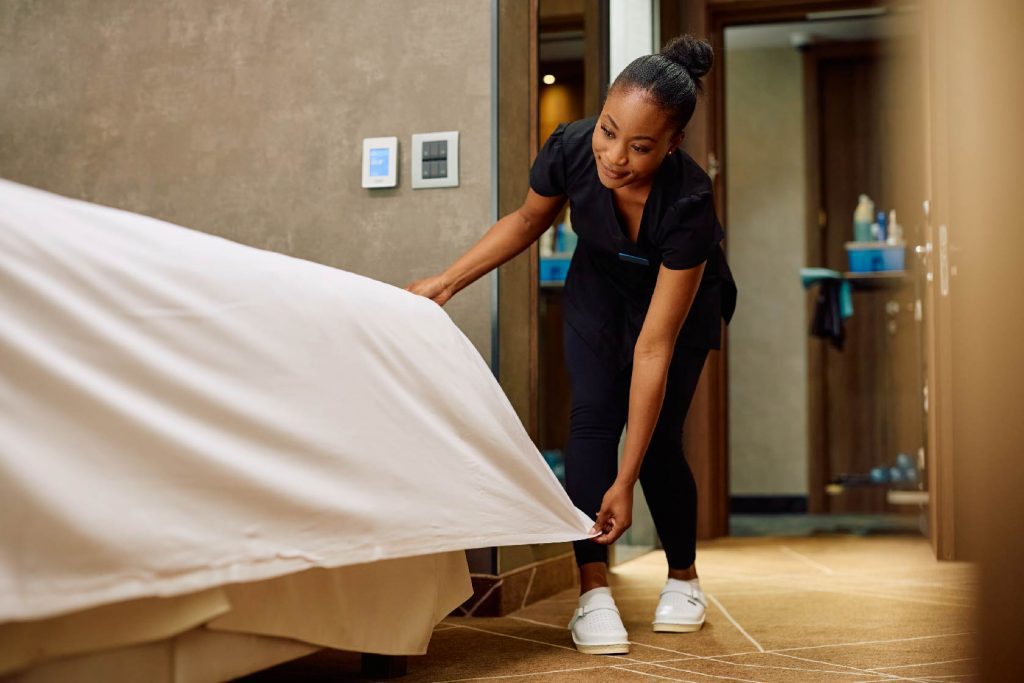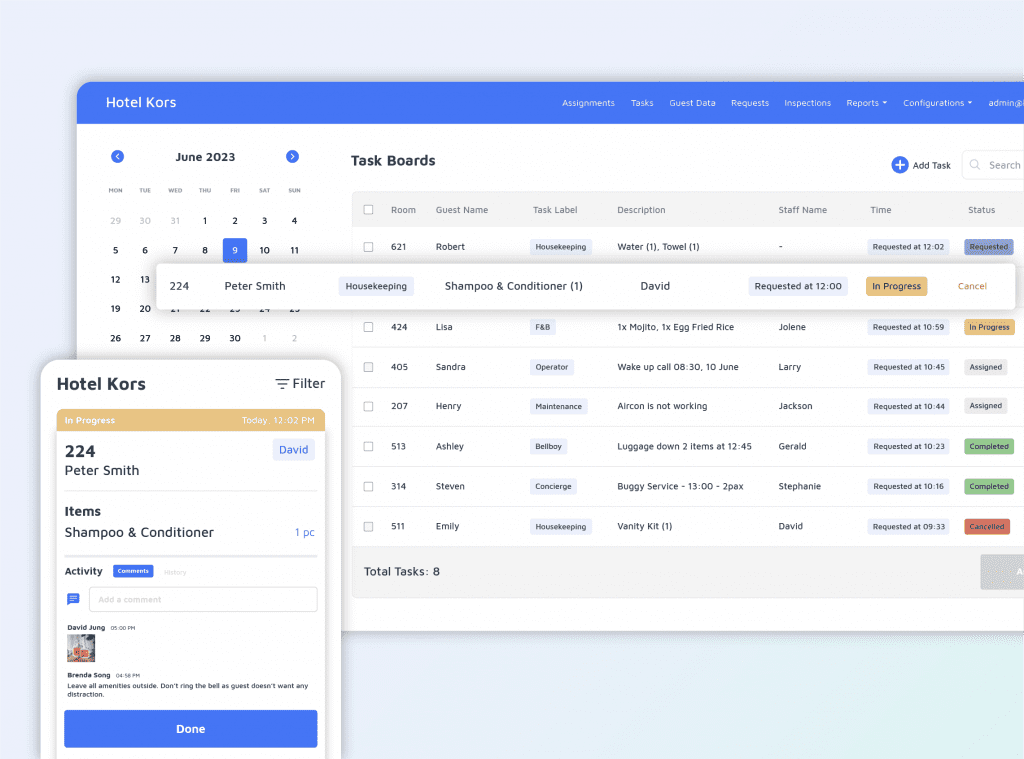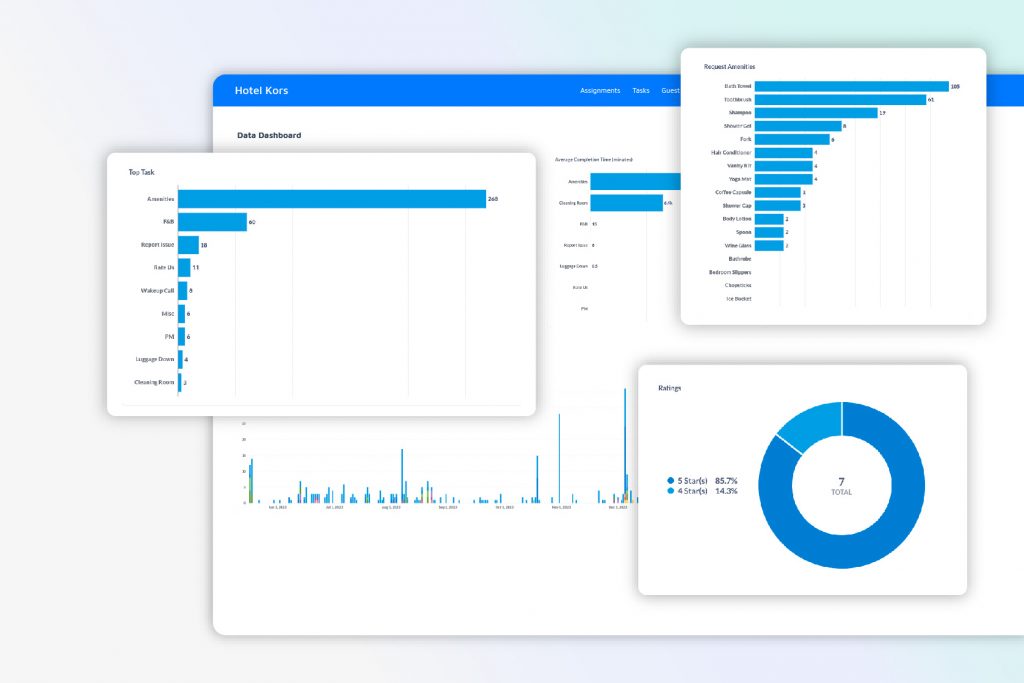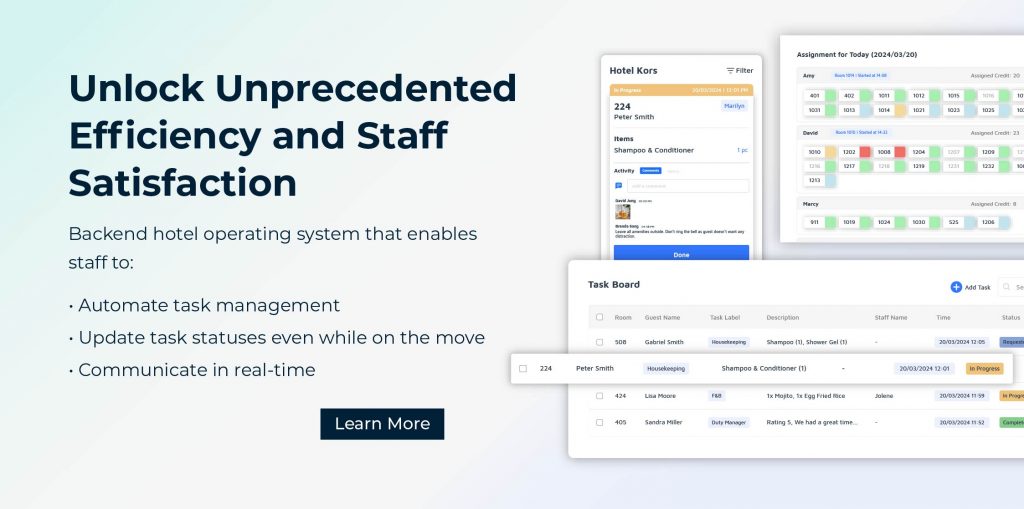
9 Ways to Increase Hotel Productivity through Staff Optimisation
Running a hotel is no clockwork. Between juggling happy (and sometimes unsatisfied) guests, keeping a spotless environment, and ensuring everything runs smoothly behind the scenes, it’s easy to feel like a crazy juggling act. What if there was a way to streamline your operations, boost staff morale, and ultimately lead to raving guest reviews? And you’d barely need to spend a cent on it. We’re talking about hotel staff optimisation.
Staff optimisation beyond scheduling is key for hotel productivity. By investing in employee development and fostering a positive work environment, you can empower your team to reach their full potential.
A recent analysis by Glassdoor showed a strong statistical link between employee well-being and the ability to deliver better customer satisfaction. So, imagine it like this: your staff becomes the center of your hotel. When they’re happy in their work environment, engaged and fulfilled, this positivity radiates outwards to create excellent guest experiences because enthusiastic staff are more likely to go the extra mile for guests, resulting in personalised and memorable interactions.
So, how do we unlock the promise to hotel staff optimisation? Let’s dive into some often-mentioned and some lesser-known staff optimisation strategies:
1. Communication is Key
Great communication goes beyond simply exchanging information. It’s about effectively conveying your message and ensuring it’s understood in the way you intend.
In the world of hospitality, this becomes even more critical. Imagine the wasted time and frustration when departments, managers, and staff don’t have a clear picture of the task at hand. Repetitive work and low morale often stem from communication breakdowns.
Fortunately, there are solutions. Regular team briefings keep everyone aligned. Open-door policies encourage information flow.
But consider this: internal communication platforms specifically designed for hotel operations can truly elevate your game. These platforms streamline communication, fostering a culture of clarity and collaboration.
2. Training Champions
Initial training is important, but what about ongoing learning? Invest in workshops or even online courses to keep your staff updated on industry trends and best practices.
But don’t let the learning stop there! Following these external sessions, host an internal workshop specifically designed to brainstorm and implement the newly acquired knowledge.
This not only reinforces learning but also fosters a sense of ownership within your team. By actively participating in shaping departmental processes, staff will feel valued and contribute to a collaborative environment.
Bonus points for incorporating fun and interactive elements into the internal workshop to boost engagement and make the learning process enjoyable!
3. Empower Your Team
Micromanagement is a surefire way to squash morale.
By trusting your staff to make decisions and solve problems, you foster a more engaged and productive work environment. A supportive team, in turn, frees you up to focus on strategic initiatives that benefit the entire organisation.
Remember, though, trust is earned.
Start by delegating smaller tasks and gradually increase responsibility as your team demonstrates competence. Your mentorship can be invaluable in guiding them towards taking on larger challenges.
4. Recognition & Rewards
Sure, compensation is important. But it’s not the only factor in employee satisfaction.
A simple “thank you” can make a big difference. Public recognition of achievements, like employee-of-the-month programs or team rewards, boosts morale and shows your staff their hard work is truly valued.
For those who want to master the art of recognition, this insightful piece by the Harvard Business Review is a great resource.
5. Automate with Tech
Automation is a very valuable friend, especially when done right.
From self-service kiosks for check-in to housekeeping management software, technology can free up your staff’s time for more guest-centric tasks.
The potential of smart technology in hotels is vast. Delve deeper into this topic here.
6. Performance Reviews
Many find regular performance reviews to be a chore, but what if they could be an opportunity for growth?
Shift the focus from a one-sided evaluation to a collaborative discussion. Use these reviews for constructive feedback, goal setting, and identifying areas for development for both your employees and the department.
Encourage your staff to share their perspectives: what resources would empower them to excel?
Technology can also be your ally. Consider using hotel management software that automates workflows and provides staff performance insights. This additional data can fuel a more objective and fair review process, benefiting everyone.
Now, let's get a little unconventional
7. Conflict Training
Almost 1 in 3 participants in a workforce survey said they have left a job because of workplace conflict. A surprising number and possibly an invisible threat.
Disagreements happen and they are inevitable, both within and across teams.
Unconstructive communication can quickly escalate tensions, leading to a lengthy repair process.
Equipping your staff with basic conflict resolution skills can help them navigate tricky situations calmly and professionally.
This Forbes article is a great guide to understanding how you can better deal with conflicts at the workplace.
8. Employee Wellbeing Matters
A happy, healthy staff is a productive staff.
Cultivating a positive culture of trust and support is one of the most effective ways to ensure employee wellbeing, and it’s entirely within your control.
In modern workplaces, one-on-one meetings (“1:1s”) are a common practice where an employee and their manager go through regular scheduled check-ins.
Hotels benefit just like any other workplace from regular 1:1s. By initiating 1:1s with your team members, you create a safe space for open communication. This increases trust and strengthens team bonds, ultimately leading to higher morale and a more engaged workforce.
9. Mentorship Magic
A well-run mentorship program is a strategic investment for hotels.
By strategically pairing experienced staff with new hires, hotels can create a knowledge-sharing program that accelerates onboarding and skill development for new employees. Not only will mentorship programs benefit new staff but it also allows senior staff to develop leadership skills.
Another advantage is that it can give you a competitive edge when recruiting top talent, especially younger generations who value professional development opportunities.
Conclusion
By implementing these staff optimisation strategies, you’ll be well on your way to a happier, more efficient team, and ultimately, guests raving about their stay at your hotel.
Remember, a small investment in your staff can yield big returns in guest satisfaction and overall success!

9 Ways to Increase Hotel Productivity through Staff Optimisation
Running a hotel is no clockwork. Between juggling happy (and sometimes unsatisfied) guests, keeping a spotless environment, and ensuring everything runs smoothly behind the scenes, it’s easy to feel like a crazy juggling act. What if there was a way to streamline your operations, boost staff morale, and ultimately lead to raving guest reviews? And you’d barely need to spend a cent on it. We’re talking about hotel staff optimisation.
Staff optimisation beyond scheduling is key for hotel productivity. By investing in employee development and fostering a positive work environment, you can empower your team to reach their full potential.
A recent analysis by Glassdoor showed a strong statistical link between employee well-being and the ability to deliver better customer satisfaction. So, imagine it like this: your staff becomes the center of your hotel. When they’re happy in their work environment, engaged and fulfilled, this positivity radiates outwards to create excellent guest experiences because enthusiastic staff are more likely to go the extra mile for guests, resulting in personalised and memorable interactions.
So, how do we unlock the promise to hotel staff optimisation? Let’s dive into some often-mentioned and some lesser-known staff optimisation strategies:
1. Communication is Key
Great communication goes beyond simply exchanging information. It’s about effectively conveying your message and ensuring it’s understood in the way you intend.
In the world of hospitality, this becomes even more critical. Imagine the wasted time and frustration when departments, managers, and staff don’t have a clear picture of the task at hand. Repetitive work and low morale often stem from communication breakdowns.
Fortunately, there are solutions. Regular team briefings keep everyone aligned. Open-door policies encourage information flow.
But consider this: internal communication platforms specifically designed for hotel operations can truly elevate your game. These platforms streamline communication, fostering a culture of clarity and collaboration.
2. Training Champions
Initial training is important, but what about ongoing learning? Invest in workshops or even online courses to keep your staff updated on industry trends and best practices.
But don’t let the learning stop there! Following these external sessions, host an internal workshop specifically designed to brainstorm and implement the newly acquired knowledge.
This not only reinforces learning but also fosters a sense of ownership within your team. By actively participating in shaping departmental processes, staff will feel valued and contribute to a collaborative environment.
Bonus points for incorporating fun and interactive elements into the internal workshop to boost engagement and make the learning process enjoyable!
3. Empower Your Team
Micromanagement is a surefire way to squash morale.
By trusting your staff to make decisions and solve problems, you foster a more engaged and productive work environment. A supportive team, in turn, frees you up to focus on strategic initiatives that benefit the entire organisation.
Remember, though, trust is earned.
Start by delegating smaller tasks and gradually increase responsibility as your team demonstrates competence. Your mentorship can be invaluable in guiding them towards taking on larger challenges.
4. Recognition & Rewards
Sure, compensation is important. But it’s not the only factor in employee satisfaction.
A simple “thank you” can make a big difference. Public recognition of achievements, like employee-of-the-month programs or team rewards, boosts morale and shows your staff their hard work is truly valued.
For those who want to master the art of recognition, this insightful piece by the Harvard Business Review is a great resource.
5. Automate with Tech
Automation is a very valuable friend, especially when done right.
From self-service kiosks for check-in to housekeeping management software, technology can free up your staff’s time for more guest-centric tasks.
The potential of smart technology in hotels is vast. Delve deeper into this topic here.
6. Performance Reviews
Many find regular performance reviews to be a chore, but what if they could be an opportunity for growth?
Shift the focus from a one-sided evaluation to a collaborative discussion. Use these reviews for constructive feedback, goal setting, and identifying areas for development for both your employees and the department.
Encourage your staff to share their perspectives: what resources would empower them to excel?
Technology can also be your ally. Consider using hotel management software that automates workflows and provides staff performance insights. This additional data can fuel a more objective and fair review process, benefiting everyone.
Now, let's get a little unconventional
7. Conflict Training
Almost 1 in 3 participants in a workforce survey said they have left a job because of workplace conflict. A surprising number and possibly an invisible threat.
Disagreements happen and they are inevitable, both within and across teams.
Unconstructive communication can quickly escalate tensions, leading to a lengthy repair process.
Equipping your staff with basic conflict resolution skills can help them navigate tricky situations calmly and professionally.
This Forbes article is a great guide to understanding how you can better deal with conflicts at the workplace.
8. Employee Wellbeing Matters
A happy, healthy staff is a productive staff.
Cultivating a positive culture of trust and support is one of the most effective ways to ensure employee wellbeing, and it’s entirely within your control.
In modern workplaces, one-on-one meetings (“1:1s”) are a common practice where an employee and their manager go through regular scheduled check-ins.
Hotels benefit just like any other workplace from regular 1:1s. By initiating 1:1s with your team members, you create a safe space for open communication. This increases trust and strengthens team bonds, ultimately leading to higher morale and a more engaged workforce.
9. Mentorship Magic
A well-run mentorship program is a strategic investment for hotels.
By strategically pairing experienced staff with new hires, hotels can create a knowledge-sharing program that accelerates onboarding and skill development for new employees. Not only will mentorship programs benefit new staff but it also allows senior staff to develop leadership skills.
Another advantage is that it can give you a competitive edge when recruiting top talent, especially younger generations who value professional development opportunities.
Conclusion
By implementing these staff optimisation strategies, you’ll be well on your way to a happier, more efficient team, and ultimately, guests raving about their stay at your hotel.
Remember, a small investment in your staff can yield big returns in guest satisfaction and overall success!
Get Access
Receive a copy of our free guide and optimise your hotel for success!
Get Access
Receive a copy of our free guide and optimise your hotel for success!



